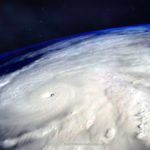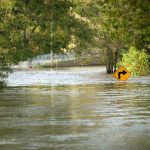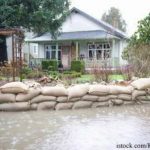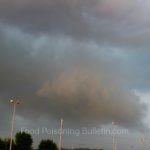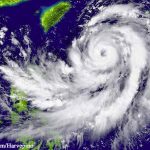Hurricane Florence is approaching the east coast of the U.S. as a Category 4 storm with winds of 140 mph. Storms of this magnitude can wreak havoc on a large area even if your home is out of reach of storm surge and high winds. Flooding and power outages can cause serious food safety issues. The CDC has some advice. If you are in an evacuation area, leave. Take medications you need with you, along with prescriptions. Avoid driving through flooded areas and standing water. If you are planning to stay, get supplies. The hurricane will probably cut off power and your water supply may end. Have at least five gallons of water per person available per day. Most experts say you should have enough water for five days, but Hurricane Florence may stall, so you may want to think about … [Read more...]
In the Path of Hurricane Lane? The USDA Is Offering Food Safety Tips
If you are in the path of Hurricane Lane, which is in the area of Hawaii, the USDA has food safety recommendations. The hurricane will pass to the south-soueast of the Big Island in the early morning hours of August 23, 2018, and will turn northwest toward the other Hawaiian Islands Thursday through Saturday. As with all hurricanes, excessive rainfall, major flash flooding, landslides, and mudslides may occur. Flooding can occur in areas that usually don't experience this disaster. Rainfall totals of more than 20 inches are possible. And power outages will most likely occur. Power outages can affect foods stored in refrigerators and freezers. Before the storm, make sure you have appliance refrigerators in your fridge and freezer to check on how safe the food is if the power goes … [Read more...]
Foods To Destroy After a Hurricane
The FDA is warning growers, distributors, and consumers that many types of food should be destroyed after a flood. After Hurricanes Harvey and Irma wreaked havoc on many areas of the southern U.S., keeping your family's food safe is critical. Some foods that have been exposed to flood waters should not be eaten. Flood waters can contain sewage, hazardous chemicals, heavy metals, parasites, and pathogenic bacteria and viruses. If the edible portion of a crop is exposed to flood waters, they must be destroyed. There is "no practical method of reconditioning the edible portion of a crop that will provide a reasonable assurance of human food safety," according to the notice. All fresh fruits and vegetables that have been in contact with flood water can't be adequately cleaned and … [Read more...]
CDC Offers Advice for Those in the Path of Hurricane Irma
The Centers for Disease Control and Prevention (CDC) is offering advice for anyone who is in the path of Hurricane Irma. This is a very dangerous storm. Everyone should have a safety plan in case any natural or manmade disaster strikes anywhere. Food safety can be compromised in the case of natural disasters. Flood waters can contain pathogenic bacteria, chemicals, and even heavy metals. And the loss of power can render perishable foods unsafe. Before the hurricane, stock up on emergency supplies. Write down emergency phone numbers. And make sure that every member of your family understands the plan. If you are going to stay, make sure you have enough clean water. Every family member should have five gallons of clean water every day. You can fill clean containers with drinking … [Read more...]
Before Hurricane Irma: Food Safety Advice From the FDA and CDC
If you are in the path of Hurricane Irma, which is now a Category 5 storm, the FDA and the CDC have some advice about protecting yourself and keeping your food and water safe. If you aren't going to evacuate, make sure you follow these instructions. First, make sure that you have a plan. Make a hurricane plan for your household and follow it to the letter. Then, put thermometers in your freezer and refrigerator. If the power is off for hours or days, the thermometer will let you know whether or not the food in that appliance is safe. Keep lots of bottled water on hand. You don't need bottled water for washing or flushing the toilet; line your bathtub with plastic and fill it up to use when you need it. Keep containers of ice on hand to keep food cold, or to melt if the water … [Read more...]
Food and Water Safety Advice for Hurricane Harvey
The FDA is offering food safety and water safety advice for anyone affected by Hurricane Harvey in Texas. Food can be rendered unsafe by power outages and by contact with flood waters. If the power went out and perishable food has been above 40°F for more than 2 hours (more than 1 hour if the air temperature is at 90°F or above) it must be discarded. Cooking won't make this food safe, since bacteria can produce toxins that heat will not destroy. If the items stayed below 40°F and you are sure of this, cook them thoroughly to a safe minimum internal temperature before eating. Once power has been restored, check the temperature of appliance thermometers in the freezer and fridge. If the thermometers are 40°F or below, the food in the freezer can be refrozen. If you didn't have a … [Read more...]
Hurricane Matthew Heading Towards You? Keep Your Food Safe
The USDA is offering food safety recommendations for people who are in the path of Hurricane Matthew. This storm will hit the eastern coast of Florida the evening of October 6, 2016 and will move up the east coast over the weekend. Forecasters expect heavy rain and significant flooding. Power outages and flooding can compromise the safety of food that is stored in your home. Take steps now to keep your food safe. Keep appliance thermometers in your refrigerator and freezer in case the power goes out. Safe temperatures are 40°F or lower in the fridge, and 0°F or lower in the freezer. Freeze water in one quart plastic storage bags or containers before the storm. These can be put into your fridge and freezer to help keep food cold. Know where you can get dry ice or block ice, and have … [Read more...]
Food Safety Tips for Hurricane Joaquin Areas
If you live in an area that is affected by Hurricane Joaquin, the USDA has food safety tips for you. This hurricane has killed seven people in South Carolina and has caused extensive flooding. These types of weather events cause power outages that could compromise the safety of food. If you do lose power, keep appliance thermometers in the refrigerator and freezer to ensure that temperatures remain 40°F or lower in the fridge, and 0°F or lower in the freezer. Water frozen in one quart containers can keep food safe for a few hours. Dry ice or block ice is a good solution too. If the power goes out, keep the refrigerator and freezer doors closed as much as possible. A closed refrigerator will keep food safe for four hours, and a full freezer will hold a safe temperature for about 48 … [Read more...]
Food Safety During a Hurricane
It's Hurricane Preparedness Week, do you know where your cooler is? Knowing some basic food safety rules during a hurricane or other weather emergency can prevent a bad situation from becoming even worse. The U.S. Food and Drug Administration (FDA) has prepared some food safety tips to help consumers through what could be a busy storm season. The National Weather Service's Climate Prediction Center estimates that during the 2013 Atlantic hurricane season there will be 13-20 named storms, 7-11 hurricanes and 3-6 major hurricanes. And during the 2013 Pacific hurricane season there will be 11-16 named storms, 5-8 hurricanes and 1-4 major hurricanes. There are several things consumers should do right now, so they have some things covered when a storm approaches. First, buy bottled … [Read more...]
Food Companies Nationwide Donate To Hurricane Sandy Relief Efforts
Food companies nationwide are donating to Hurricane Sandy relief efforts. Some are making cash contributions to the American Red Cross, others have created ways to make it easy for their customers to contribute to disaster relief efforts. The General Mills Foundation in Minneapolis, Minn. is donating a total of $250,000. Half of the money will go to the American Red Cross and the other half will go to Feeding America."We are eager to support the critical work being done by our dedicated partners, the American Red Cross and Feeding America, as they bring relief to those affected by this terrible storm," Ellen Goldberg Luger, General Mills Foundation executive director said in a statement. Food Lion, which operates more than 1,100 supermarkets in 10 Southeastern and Mid-Atlantic … [Read more...]
